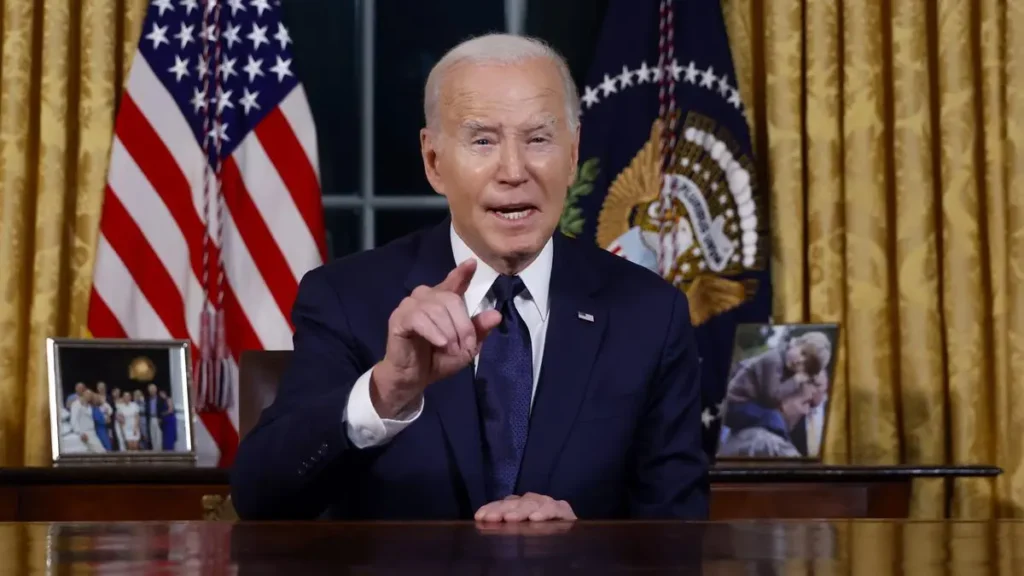
On Friday, the White House released a comprehensive set of proposals aimed at strengthening Israel and Ukraine during their ongoing conflicts, as well as investing in domestic defense manufacturing, humanitarian aid, and managing the influx of migrants at the U.S.-Mexico border. The proposals include a request for supplemental funding from Congress to support national security and provide assistance to allies and partners. The US government has proposed a budget of just over $105 billion for these purposes.
During his Oval Office address, President Joe Biden emphasized the need to move the legislation quickly and to strengthen the US support for its allies. Jake Sullivan, National Security Adviser to Joe Biden, has described the two ongoing wars as a “global inflection point” and has highlighted the significance of the proposed funds in ensuring the safety of Americans.
President Biden called for additional US aid for Ukraine and Israel, saying that “American leadership is what holds the world together”. The US government has proposed a budget of $61.4 billion for Ukraine and $14 billion for Israel. The proposed funds for Israel are intended to provide security support, bolster Israeli efforts to secure the release of hostages, and extend humanitarian aid to civilians affected by the war in Israel and Gaza. The proposed funds for Ukraine are intended to provide training, equipment, and weapons to help Ukraine defend itself against Russia’s invasion and to recapture its territory.
The proposed budget also includes additional funds to support US-Mexico border security. This includes more patrol agents, machines to detect fentanyl, asylum officers, and immigration judge teams. The proposed budget for border security is $14 billion. Additionally, the US government has proposed funding to strengthen security in the Indo-Pacific region, including Taiwan. The proposed budget for this purpose is $16.3 billion.
It is important to note that the budget progress could face delays as the House of Representatives remains in disarray with the Republican majority struggling to select a new speaker.
The Republican majority has nominated Rep. Steve Scalise to be the next House speaker; however, they must try to unite their deeply divided majority to elect the conservative in a floor vote after ousting Rep. Kevin McCarthy from the job. The vote is expected to be close, and it is unclear whether lawmakers who supported Rep. Jim Jordan, the Judiciary Committee chairman favored by hardliners, will throw their support behind Scalise.
It is important to note that the relief package is designed to provide support to all individuals, regardless of their immigration status. However, some provisions in the package may exclude certain groups of people, such as undocumented immigrants, from receiving aid. This has led to concerns about the effectiveness of the package in addressing the needs of all those affected by the pandemic.
Despite these challenges, it is crucial that policymakers work together to ensure that the relief package is implemented effectively and efficiently. This requires a collaborative effort from all stakeholders involved, including government officials, community leaders, and citizens alike. By working together, we can overcome these challenges and ensure that those who need help receive it in a timely and effective manner.
Shalanda Young, the director of the Office of Management and Budget, has stated that Republicans would be hypocritical to oppose President Biden’s proposal for a relief package, given their protests against border management policies. However, the implementation of the relief package may face challenges due to policy debates and immigration laws. These debates may lead to delays in the distribution of funds and resources, which could have a significant impact on the people who need them the most.
“We will not be lectured by those who refuse to act. As we’ve said repeatedly, Congress needs to take action to provide sufficient resources for the border,” Shalanda Young said.
White House has proposed to allocate approximately $14 billion of the relief package funds towards border security. The funds will be used to boost the number of border agents, install new inspection machines, detect fentanyl, and increase staffing to process asylum cases.
Apart from $14 billion, $61.4 billion is proposed to support Ukraine amid its war with Russia. “The world is closely watching what Congress does next,” Jake Sullivan said. Moreover, in the midst of its war against the Hamas militant group in Gaza, Israel would received $14.3 billion in assistance. The majority of that money would help with air and missile defense systems.
ALSO READ | Hamas releases 2 American hostages after two weeks in captivity